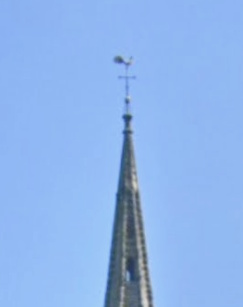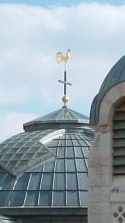Cock and Cross

On this page we're not considering a chicken, but a cock (or rooster in American English). Also, we're using cross not as a verb, but as a noun. And the mystery is even more profound than a chicken crossing the road. With us so far?
A cock can be seen on the Arms of Christ; a weapon in Christ's armoury for defeating evil.
There are a few interesting legends about cocks (or cockerels) miraculously leaping out of cooking pots at around the time of Jesus' Crucifixion, but there's not much plausible evidence to support such stories.
The Arms of Christ are symbolic of Christ's armoury for defeating evil. By far the most common explanation for a cock's inclusion is the well-known denial of Jesus by Peter (Matt. 26:34, 74, 75, Mark 13:35; 14:30, 68, 72). The cock, it will be remembered, was part of Jesus' prophecy that Peter would deny knowledge of Jesus. Now, Peter was a faithful follower of Jesus and generally believed anything Jesus said. But this prophecy of denial was just something Peter couldn't accept would happen.
But happen it did, and the cock's crowing reminded Peter that he'd failed his Master. Peter's denial was not a lapse of spiritual faith in Christ, but he nevertheless succumbed to physical fear and cowardice. Many Christians convince themselves that they are faithful followers of Christ and don't want to accept that they will let Jesus down. The Cock and Cross reminds Christians of their vulnerability.
After the denial, Jesus turned his gaze toward Peter, and Peter at once realised his mistake. Just a short while before, Peter had said: "I will be with you even unto death, and I will lay down my life for you." Yet here he was, timidly denying Jesus. Can we even begin to imagine how Peter felt? 'Small' would be an understatement! Yet we must remember also that Peter laudably pulled himself up again after his failure, and continued to preach the message.
Cocks are vicious fighters. If a cock goes down, it picks itself up and keeps fighting, until death. The cock is considered part of the armoury against evil because even though we fail Christ, more than once, he can forgive us. And we can stand tall again to resume our mission.
Other Cocks and Crosses
-
The cock is seen on weather vanes and lightning conductors, and can also be seen in conjunction with a cross on many church spires and domes.

For example, the 13th century St. Oswald's Parish Church in Ashbourne, Derbyshire, England - though to be frank, it's not so easy to see without binoculars, since the magnificent spire is 65 metres tall.
(Discover more about the church - and plenty of other great things to see and do in Ashbourne and the beautiful surrounding area - on the town’s new website: ashbourne-town.com-uk.com)

St. Peter in GallicantuIn Jerusalem is a church known as 'St. Peter in Gallicantu' (English name: 'Church of St. Peter and the Crowing of the Cock'). On its sanctuary roof is a black cross surmounted with a golden cock. The church is situated at one of the places Peter is believed to have denied Christ.
In ancient Gaul, the Celtic god Lugus is identified with the Roman god Mercury and the Greek Hermes. For over 2,000 years the iconography of Lugus has included the cock, which is today the emblem of France. The cock, or a younger cockerel, appears on many French badges and other insignia, one of which is a medal awarded to soldiers of the 1939-45 war against the Axis powers. This hexagonal medal shows a cockerel and a Cross of Lorraine.
In the English nursery rhyme:
Ride a cock horse to Banbury Cross
To see a fine lady upon a white horse
With rings on her fingers and bells on her toes
She shall have music wherever she goes...'she' is generally understood to be either Lady Katherine Banbury or Queen Elizabeth I; the Banbury Cross is an old Market Cross in Oxon, England; and 'cock horse' is a large stallion.
Why did the priest cross the road? (Answer)
Ecclesiastically, 'Mystery' is related to 'Sacrament' (sacramentum is a Church Latin loan-translation of the Greek mysterion). The Early Church was persecuted until the early 4th century so sacred rites and other elements of Christianity were kept secret from the pagan Roman authorities. In time, the Church became less secretive, but the term 'mystery' continued to be used.